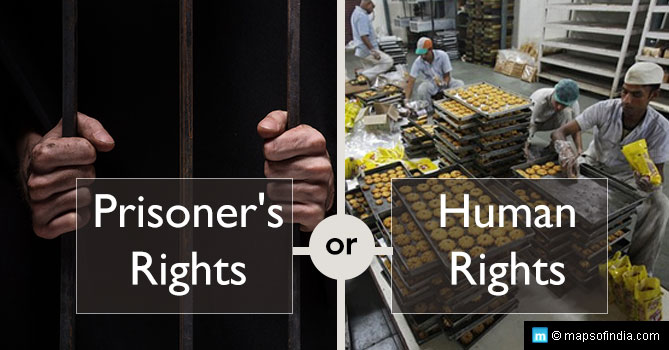कैदियों के अधिकार या मानवाधिकार?
In 1981, police authorities in a Bihar prison allegedly blinded suspected criminals with needles and doused them with acid. The case, Khatri vs. State of Bihar is now also known as Bhagalpur Blinding Case.
In 2015, the minor rapist from Nirbhaya case walked out of the correction center as a free man. He was barely months away from turning 18 when the crime was committed, and yet he was put into a correction center for 3 years, while others were given a death sentence.
If we look at the two cases, our morals get entangled in a dilemma. The first one makes us worry about prisoner’s safety in India, the second one about their privilege. As the debates about prisoners’ rehabilitation and treatment are ongoing in India, let’s look at their present day conditions.
Indian prisons
The Supreme Court once famously said that “the quality of a nation’s civilization can be largely measured by the methods it uses in the enforcement of criminal law”. How we treat our criminals, therefore, becomes a reflection of our nation. In this regard, prisons are often considered a place for transformation of prisoners, so that one day when they go out in the real world, they go out as good citizens. However, that is far from the truth that goes on within our prison walls every day.
Overcrowding of prisons has been declared a violation of human rights by the Apex Court. And yet, there are several prisons in India with containment nearly 100%, and sometimes even 150% beyond capacity. According to the Ministry of Home Affairs, about 1700 prisoners died in overcrowded prisons in 2014. 89% of these deaths were from natural causes, also raising questions about healthcare in prisons. From 2011 to 2014, Odisha prisons reported an increase of 1,367% in unnatural deaths. The female convicts are often not even given basic facilities like sanitary napkins.
On top of the desperate lack of care in prisons, there are cracks in our judicial system that seep through. Torture under custody is not exactly unheard of in the Indian context. According to official data by the Human Rights Watch, at least 591 people died in police custody between 2010 and 2015. Indian Law has set down a proper framework for the legal enforcement process, including the treatment of arrested people, and conducting questioning. However, procedures to get confessions or information are quite often unethical, even leading to deaths in cases. Analysis of autopsy reports by the Human Rights Watch revealed injuries that indicate blunt force trauma, hinting at a probable torture.
Undertrials and rehabilitation
Legally, being undertrial means you are not guilty; not yet, at least. However, due to the lags in our trial process, suspected criminals undergo confinement for years even before they are declared guilty. As on March 31, 2016, two out of every three inmates are undertrials. In some cases, they spend more time in prison than the sentence of the crime they are being charged with. A large number of these convicts even fall under the category of bailable crimes.
While jails like Tihar Jail are making initiatives focusing on the rehabilitation and recruitment of prisoners, it is still largely a luxury for many. Many of the convicts with drug addiction, for instance, are kept in jails without any scope for rehabilitation. Several of them end up attempting suicide, desperate for an escape from the withdrawal symptoms; many succeed. The statistics for attempted suicides are almost twice inside prisons as compared to outside. A large segment of these are first-time convicts, already losing hope of redemption.
The moral dilemma
The Nirbhaya case minor presently works in South India as a cook. His identity stays protected, for obvious security reasons. Details of the crime have revealed that he was among the most brutal assaulters in the gangrape, having shown no signs of remorse till date. Incidents like this one make us rethink our faith in the judicial establishment. How right is it to vouch and work for the rehabilitation of such criminals? But then, on the other hand, we have countless prisoners rotting away in prisons for petty crimes way beyond the acceptable time frame. Most of them are not even aware of their right to get free legal aid.
Needless to say, there is a fine line beyond which redemption becomes obsolete, some crimes are that grave. But in the meantime, one cannot ignore the dire need of reforming our prison system. There are barely any provisions for convicts with disabilities, or the ones with mental disorders. Psychological help is a far cry for prisoners, causing many to fall into an inevitable mental breakdown. So, while we debate over who deserves rehabilitation, we must make sure that those who do, have the means to get it.






